‘Slow death’: Mount Arapiles climbing ban could destroy iconic town
The stakes for Australia’s climbing Mecca could not be higher. This is not just a fight for climbing routes; it is a fight for identity, for community, and for the delicate balance that has allowed the picturesque town of Natimuk to thrive | WATCH
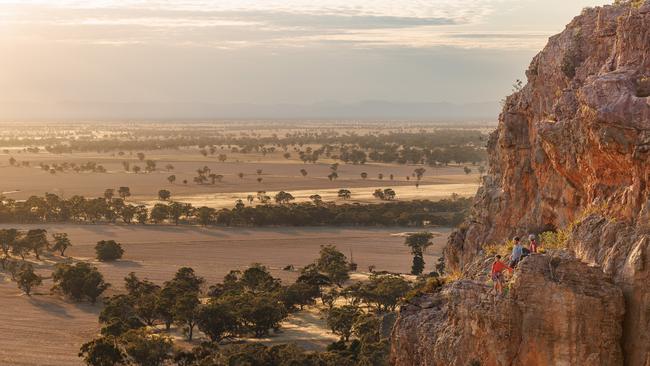
Melissa Edwards’ life has been shaped by the mountain.
It’s where she fell in love, where she forged her career as a climbing guide, and where she dreams of building a future with her fiance, Benjamin. But now those dreams are shrouded in uncertainty.
Once a haven for rock climbers and adventurers from across the globe, the picturesque western Victorian town of Natimuk is in despair. This vibrant community of 500 people, half of whom are intimately tied to the art and livelihood of climbing, faces the grim reality of a government decision that could strip away its soul.
For decades, the cliffs of Mount Arapiles witnessed countless stories of triumph and connection.
Yet now, under the guise of cultural and environmental preservation, the state government’s plan to close half the climbing routes threatens to sever the lifeline that binds this town together.
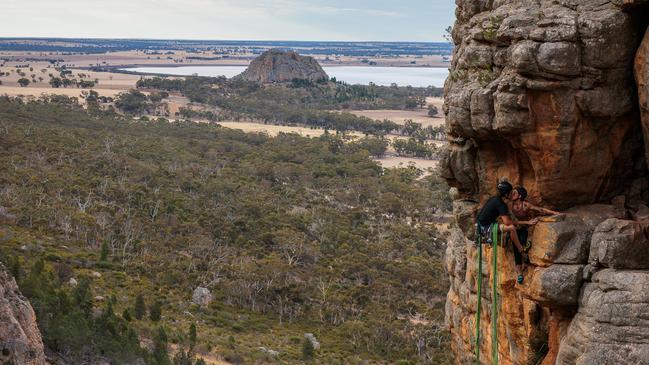
Aboriginal artefacts, scarred trees, and rock art are treasures worthy of protection, but the abruptness of the proposed restrictions have left Natimuk’s residents reeling, their voices drowned out in the rush to impose change.
The draft management plan doesn’t just threaten Edwards’ livelihood; it threatens her sense of belonging.
“The mountain is more than a workplace for me, it’s a backdrop to my most cherished memories and a symbol of the life I chose,” she tells The Weekend Australian.
“Within a few months, people have chosen to abandon Natimuk, others who considered buying homes here chose to look somewhere else. The draft management plan is logistically restricting our access and the type of activities we can take part in.”
Even those who have stood at the forefront of preserving and celebrating Mount Arapiles feel betrayed.
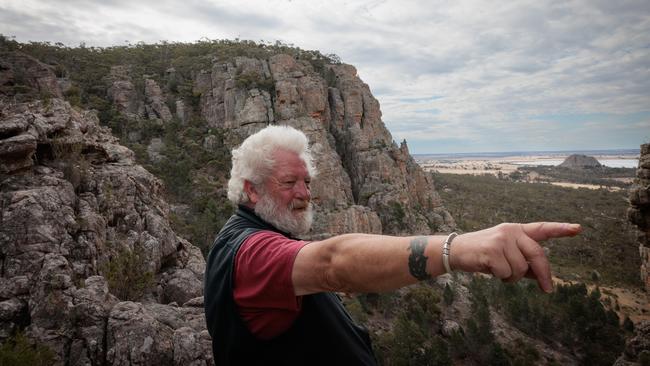
Glenn Robbins, a climbing photographer who has spent decades championing the mountain on the international stage, feels the sting of abandonment.
Robbins’ work has brought climbers from across the world to Victoria, drawn not just by the rock but by the unique community that has grown around it. He was one of the first people to permanently live in Natimuk, having arrived in 1978.
“Watching the bans unravel is like witnessing the erasure of a legacy built with care and dedication,” he said.
“Mount Arapiles is regarded as one of the top climbing destinations in the world and the Victorian government is willing to throw that away with this draft management plan.”
Parks Victoria interim chief executive Gus Dear will visit Natimuk next week as part of a promise by the Allan government to consult better on the planned climbing changes. However, the government’s own cultural heritage laws are being used as the excuse to crack down on climbing, creating hostility among many climbers and traditional owners.
The bans also threaten to rid the town of one of its few general practitioners, Dr Felix Ritson, who is also a devoted climber.
“With the current plan, we would expect a slow death of Natimuk and the entire rock climbing community here,” he said.
Losing access to the mountain would strip him of his hobby, his community, and his connection to the land he cherishes. “If that happens, I would probably leave the area,” he says.
The consequences for Natimuk would be dire.
“I provide mental healthcare, chronic pain care, and addiction care. There are very few doctors in the area that offer those services. My departure would have a massive impact.”
Lachlan Hick, the town’s only electrician, said he would also consider leaving his home town of three decades.
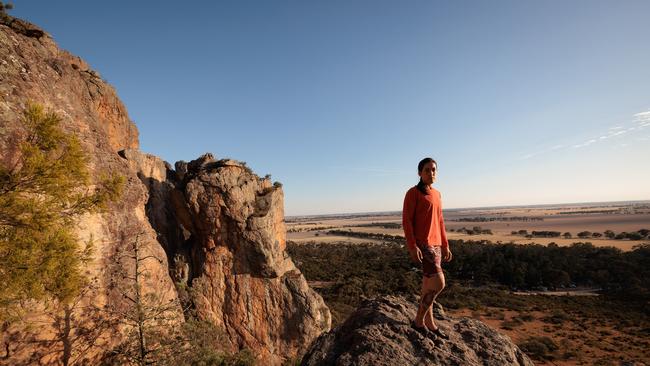
His assistant has already left. A long-awaited plumber, whose arrival could have eased years of struggle for the town, changed his mind after hearing of the closures.
“Within the first week of the draft coming out, my assistant immediately got a job in another town. That person said … ‘well, what’s the point in this?’.”
Richard Ham, a former president of the RMIT Outdoors Club, likens Mount Arapiles to a Mecca for climbers.
“This is the crown jewel of Australian climbing,” he said, his voice tinged with both pride and sorrow.
“The blanket bans target climbs that are unparalleled anywhere in the world. It’s not just about losing access to routes; it’s about losing the very essence of what makes this place unique. We’re willing to embrace cultural interpretation and find ways to coexist, but to see these restrictions imposed without dialogue feels like a betrayal.”
The Country Fire Authority relies heavily on volunteers who are also climbers. Without them, the town would crumble in the face of a disaster.
The psychological toll is no less severe. Anxiety and depression have seeped into the lives of many residents, their futures clouded by the fear of losing what they hold most dear.
Some liken the divisive proposal to the national referendum on the voice to parliament, pitting values and identities against each other in a battle for recognition.
Residents such as Constantine Dritsas refuse to accept that one culture must be sacrificed for another. “There’s a lot of friction in the community because there’s a wide range of anxiety about the future in this town,” he said. “When you’ve got such a controversial issue, it becomes divisive. It’s no different to the voice to parliament, for example. The climbing ban is like a nail in the coffin for this community.”
The Barengi Gadjin Land Council Aboriginal Corporation, the body representing traditional owners of the area, has been approached for comment.
The stakes for Natimuk could not be higher. This is not just a fight for climbing access; it is a fight for identity, for community, and for the delicate balance that has allowed this town to thrive.
For Edwards, Hick, Robbins and countless others, this is more than a policy decision. And as the sun sets over Mount Arapiles, casting its golden light on the cliffs that have witnessed so much, the people of Natimuk hold fast to the hope their voices will be heard and their future will not be written without them.



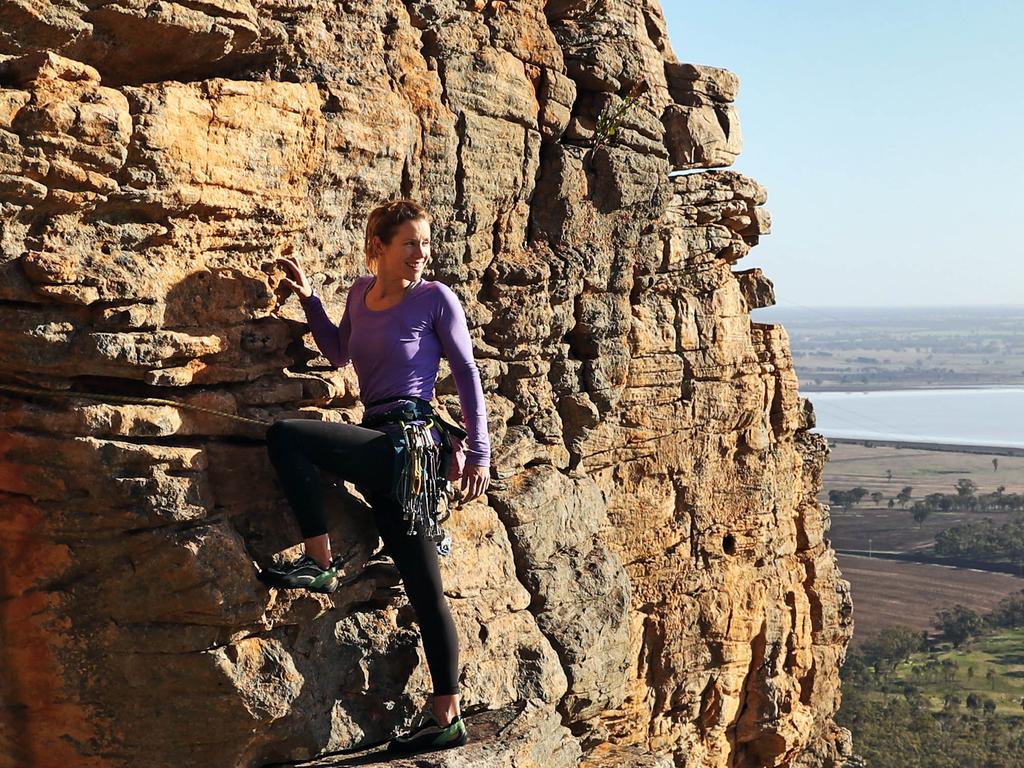


To join the conversation, please log in. Don't have an account? Register
Join the conversation, you are commenting as Logout